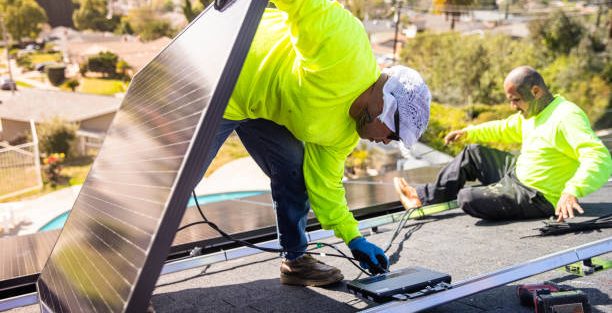For many Nigerians, investing in solar energy feels like the ultimate way to escape NEPA cuts and reduce generator costs.
No more noisy gen. No more diesel bills. No more “Nepa don take light.”
But here’s the reality: Solar power in Nigeria isn’t magic. It’s just one part of a smart energy management plan.
Thousands have spent millions on solar systems for their homes in Nigeria, only to find they still rely on generators.
Why? Because they fell for myths that we’re about to bust.
Myth #1: “Once I install solar, my power problems are over.”
This is the biggest myth around solar installation in Nigeria.
Most homeowners think once the panels go up, it’s game over for darkness.
But your power reliability depends on:
The actual capacity of your solar inverter and batteries.
Your daily energy habits.
Even local weather patterns.
Myth #2: “The bigger the inverter, the better.”
People often rush to buy the biggest inverter for home use in Nigeria, thinking that solves everything.
But an inverter’s job is only to convert DC power from your batteries into AC power for your house.
If your batteries can’t store enough energy, or your solar panels aren’t charging well, a massive inverter does nothing.
It’s like buying a huge water tap and connecting it to a tiny bucket.
It empties quickly.
Myth #3: “As long as I have enough panels, I’m fine.”
Panels are crucial — they’re your power factory.
But they don’t store anything.
That’s why in Nigeria, most people run into trouble at night.
Because after sunset, your system depends on battery storage.
Port Harcourt example: A shop owner installed 8 solar panels but only 2 batteries to save cost. So by evening, he still ran a generator for his fan and freezer.
If you want solar power that works at night in Nigeria, you need the right balance of panels and batteries.
Myth #4: “You don’t need an energy audit. Just estimate.”
This is a big mistake. A proper energy audit in Nigeria tells you: How much power each appliance uses (your load).
When your peak demand happens. What you need to run at the same time.
Quick numbers:
A small fridge = 120W x 24 hrs = 2.9kWh/day
A fan = 75W x 12 hrs = 0.9kWh/day
A TV = 80W x 6 hrs = 0.5kWh/day
So that’s over 4.3kWh daily.
If your batteries store only 2kWh, your lights WILL go off.
Doing an energy audit before solar installation in Nigeria prevents wasted money and frustration.
Myth #5: “Who needs a hybrid system? Solar alone is enough.”
With Nigeria’s erratic power supply and heavy appliances, the smartest homes use hybrid power systems. That means: Solar panels + batteries for day-to-evening loads.
Grid power (PHCN) when available. Generator for heavy loads like pumping water or ironing.
Practical example:
Use solar to power your TV, fan, and lights during the day. Let your batteries carry you till bedtime. Run the gen only when doing heavy tasks — or when days are cloudy.
This setup cuts your diesel bills, prolongs battery life, and gives true 24/7 power reliability.
Bonus Myth: “I don’t need to change my habits.”
Even the best solar power solutions in Nigeria can’t handle careless usage.
Running multiple heavy appliances at once? Leaving everything on standby overnight? These habits kill your batteries faster.
Smart energy management in Nigeria often starts with simple discipline: Use LED bulbs. Stagger heavy appliances. Switch off completely when not needed.
FAQs on Solar Energy in Nigeria
Q: How many solar panels do I need for my house in Nigeria?
A: It depends on your daily energy consumption. A proper energy audit gives you an accurate figure.
Q: Why is my inverter shutting down at night?
A: Your batteries likely aren’t storing enough to meet your evening demand.
Q: Is solar better than a generator in Nigeria?
A: A hybrid system (solar + gen + grid) often saves more money long-term than relying on a generator alone.
Q: What’s the cost of a hybrid solar system in Nigeria?
A: It varies based on your load. Many Nigerians spread the cost using financing options.
Conclusion: How to get it right
Bottom line: Solar is powerful — but it’s not magic. It needs to be part of a carefully planned hybrid system designed around your lifestyle.
If you want reliable power, fewer generator hours, and long-term savings, start by:
Doing an energy audit.
Balancing your panels, batteries, and inverter.
Changing usage habits.
And investing in a hybrid setup.






2 Comments
Kristi Reed
Hi there,
I just wanted to quickly share a funding opportunity that’s helping thousands of small business owners access capital they don’t have to pay back.
– $500M+ recovered for businesses across industries
– No repayment required – this is not a loan
– 90% of businesses qualify, even if you were previously denied
– Quick, no-pressure consultation – takes just a few minutes
Whether you missed out on ERC or took advantage of it, there still may be funds available to you.
+ Start here: https://stryde.me/pages/stryde-savings/761691
No upfront cost, and you’ll know quickly if you’re eligible.
Best regards,
Kristi
In case you wish to stop getting subsequent notifications from this message, just fill the form at bit. ly/fillunsubform with your domain address (URL).
Da Costalaan 102, Clay, CA, USA, 91036
manager
Thank you for sharing this with me.